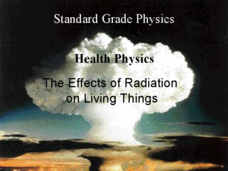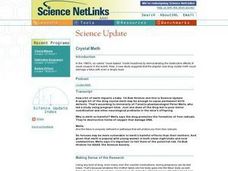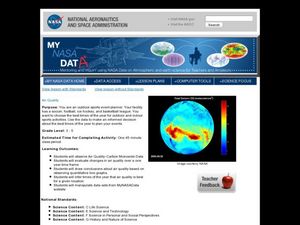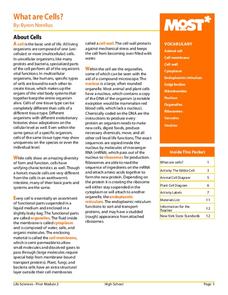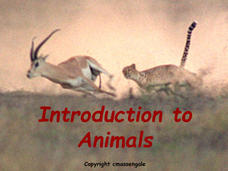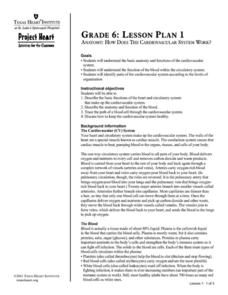Curated OER
Oh That Gross Digestive System!
Learners get an understanding of the main components of the digestive system and how the system takes the food we eat and converts it into energy.
Curated OER
The Cell
In this biology activity, students identify and locate various vocabulary terms related to cells of the body. There are 31 biology terms located in the word search.
Curated OER
Endocrine System
In this endocrine system worksheet, students match the correct gland found in the endocrine system to its hormone and target cell(s). They also describe the actions of each gland and hormone combined together.
Curated OER
Health Physics: The Effects of Radiation on Living Things
A mix of scientific details and background information about the well-known sites of radiation attacks or accidents. This topic may open up details that you may consider as sensitive, and could be upsetting to some pupils. This is a...
Curated OER
Anatomy Review: The Heart
In this anatomy review worksheet, students read through notes over the heart, label 11 diagrams and complete 7 review questions.
Serendip
Cell Differentiation and Epigenetics
Pregnant women exposed to PAH air pollution increase the risk of obesity in their children. The example of epigenetics, along with others, builds the basis for understanding the process of cell differentiation. Scholars view a video,...
University of Minnesota
Dendritic Spines Lab
This is your brain on drugs ... literally! Your neuroscientists-in-training examine the evidence of drug use on the human brain and how neurons change their connectivity when altered by drugs. They then work together to create testing...
University of Minnesota
Neurotransmission Model
Don't lose your marbles — you'll need them for a lesson on neurotransmission. Young scholars build a neurotransmission model using marbles, beads, rubber bands, string, and other elements. After studying specific neurotransmitters,...
Curated OER
Alcohol and Pregnancy Don't Mix!
Seventh graders learn about John Kellerman, a youngster who was born with Fetal Alcohol Syndrome. They learn how alcohol and pregnancy doesn't mix.
Bridge
Mercury - Mercury is Rising
Hold a discussion in your class about the increase in mercury being found in fish that are caught commercially as food for humans. Given a worksheet, learners then calculate how much fish a person can safely eat each month to remain...
Curated OER
Acids and Bases
In this acids and bases worksheet, students complete 32 fill in the blank and short answer questions on acidity or alkalinity. They color molecular diagram according to the key.
Curated OER
Chemical Energy
In this science worksheet, students read about enzymes and nutrition. Students also answer 2 comprehension questions about the reading.
Curated OER
Pandemic
High schoolers examine contagious diseases. They explore different types of bacteria and the illnesses they cause.
Curated OER
Crystal Meth
Learners read and discuss an article on the devastating effects of crystal meth on a fetus development in mice. They relate this research to the possible causes of birth defects in babies whose mothers have used meth during pregnancy.
Curated OER
Amphibians
In this amphibian worksheet, students will review the characteristics of the class Amphibia, including frogs and toads, salamanders, and caecilians. This worksheet has 3 short answer questions, 5 matching questions, 6 multiple choice,...
MOST
What Are Cells?
What's in a cell, anyway? Kids read informational text on what makes up both animal and plant cells, including a page of vocabulary terms they will need to be familiar with (cytoplasm, ribosomes, vacuoles, etc.). Full-color images...
Curated OER
Air Quality
Learners observe air quality and monoxide data. For this air quality lesson, students draw conclusions and manipulate data from a one year period on changes in air quality.
Curated OER
What Are Cells?
Energize the cells of young biologists with an edible life science activity. Engaging students in exploring the inner workings of plant and animal cells, this activity involves using colored jello and various sweet and...
Biology Junction
Plant Diversity
Ginkgo trees existed for more than 350 million years, and, at this time, only one species still remains. While plant diversity generally increases over geologic time, some interesting exceptions occur. Young scientists learn about plant...
Biology Junction
Introduction to Animals
Out of all animals, elephants alone lack the ability to jump. Scholars learn all about animals using a presentation full of fun examples. It describes different types of animals, the biological similarities and differences between...
Curated OER
Using Ionising Radiation in Medicine
This is an information-intense presentation for any science class you might be teaching that will study ionising radiation. The material is specific to cancer diagnosis and treatment, and one of the forty-two slides also touches on using...
Texas Heart Institute
Anatomy: How Does the Cardiovascular System Work?
How can the circulatory system compare to a city map? Pupils distinguish the "roadways" and "vehicles" of the cardiovascular system, compare the anatomy and function of veins and arteries, and review different types of blood cells with...
Curated OER
Bug's Eye View
Investigate the life of bugs and how they interact with the environment in this integrated science and language arts lesson. Young scientists construct mini environments in cages in order to make observations. This data forms the basis...
Curated OER
Habitat Hopscotch
Students analyze different habitats. In this habitat lesson, students evaluate what animals need in their habitats. Students participate in the game Habitat Hopscotch.



